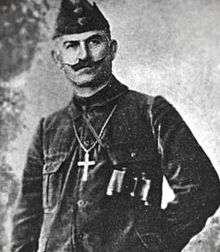Spyros Spyromilios
| Spyros Spyromilios | |
|---|---|
 | |
| Nickname(s) | Eagle of Himara (Greek: Ο Αϊτός της Χειμάρρας) |
| Born |
1864 Himara, Ottoman Empire |
| Died |
19 May 1930 Athens, Greece |
| Allegiance |
|
| Service/branch | Gendarmerie |
| Years of service | 1896–1926 |
| Rank |
|
| Commands held | Civil governor and military commander of Himara (1914)[1] |
| Battles/wars |
Greco-Turkish War (1897) Greek struggle for Macedonia First Balkan War Northern Epirus Autonomy Struggle |
| Other work | Member of the Greek Parliament (1915-1917) |
Spyros Spyromilios (Greek: Σπύρος Σπυρομήλιος; 1864–1930) was a Greek Gendarmerie officer who took part in the Greek struggle for Macedonia and the Balkan Wars. In 1914 proclaimed the Autonomy of his native town, Himara, and joined the autonomist struggle of Northern Epirus against its inclusion within the newly established Principality of Albania.[2]
Life
Spyromilios was born in Himara, then Ottoman Empire.[3] In May 1905 he led one of the first armed groups to be assembled for the developing Macedonian Struggle. Adopting the nom de guerre "Athalis Bouas" or "Kapetan Bouas", he led his own group of 35 men in the region of Vermio in Ottoman-held Macedonia. He was however wounded in his leg within days, in an exchange of fire with pro-Bulgarian komitadjis, and was forced to go to Thessaloniki to be treated. By 1909 he had risen to the rank of Captain, and took part in the Goudi military coup d'état.
At the outbreak of the First Balkan War in October 1912, he was positioned at the Ionian island of Corfu.[3] There, he assembled a small corps of volunteers from his home region, augmented by 200 Cretan volunteers. On 5 November, Himara rose in revolt and his force landed and occupied this coastal region, without facing initially resistance. Spyromylios then suggested to the Greek Prime Minister Eleftherios Venizelos that the Greek Army should immediately capture the city of Vlorë, north of Himara.[4] However, on November 28, the Albanians declared their independence in Vlorë and formed a provisional government. The Greek headquarters expected full-scale attack in the area and ordered him to retreat. He rejected the order and remained in the region organizing the local defense.
When the Second Balkan War ended, a series of peace treaties and protocols awarded the area to the newly formed Albanian state and the Greek forces were ordered to evacuate the area. At 9 February 1914 Spyromilios refused to withdraw and declared the region’s autonomy and himself as captain of Himara. Himara became part of the Autonomous Republic of Northern Epirus, proclaimed on February 28 in Gjirokastër.
Spyromilios became member of the Greek Parliament for the Argyrokastron Prefecture at the following elections. At September 1916, when the Italian army entered the region he escaped to Athens. In the next years he was involved in the Northern Epirus issue. At 1926 he was honorary discharged with the rank of Colonel.
Legacy
It is noteworthy that Spyromilios kept correspondence with Albanian personalities, discussing the region’s political future. A distinguished Albanian, Eqerem Bej of Vlorë, noted that Spyromilios and his family were known for their loyalty towards their friends, bravery and persistence.
Spyromilios’ family mansion in Himara, is one of the town’s main attractions, although abandoned today.
References
- ↑ ...], Hellenic Army General Staff, Army History Directorate. [Ed. comm.: Dimitrios Gedeon (2000). The struggle for Northern Epirus (1.udg. ed.). Athens: Hellenic Army General Staff, Army History Directorate. p. 120. ISBN 9789607897404.
Spyromelios, the civil governor and military commander of Cheimarra
- ↑ Sakellariou M. V.. Epirus, 4000 years of Greek history and civilization. Ekdotikē Athēnōn, 1997. ISBN 978-960-213-371-2, p. 382: "born in the Northern Epirote town of Cheimara and a major in the Greek army, proclaimed the autonomy of Cheimara"
- 1 2 ...], Hellenic Army General Staff, Army History Directorate. [Ed. committee: Dimitrios Gedeon (1998). A concise history of the Balkan Wars, 1912-1913 (1.udg. ed.). Athens: Hellenic Army General Staff. p. 167. ISBN 9789607897077.
Accordingly, in early October it sent Major of the Gendarmerie Spyros Spyromelios, who hailed from Cheimarra
- ↑ Kondis Basil. Greece and Albania, 1908-1914. Institute for Balkan Studies, 1976, p. 93.
Sources
- Contested Spaces and Negotiated Identities in Dhermi/Drimades of Himare/Himara area, Southern Albania. Nataša Gregorič Bon. Nova Gorica 2008. Page 143-144.
- Ruches, Pyrrhus J. (1965). Albania's captives. Chicago: Argonaut.
Further reading
- Αλβανοί και Αλβανισταί. [Albanians and Albanists] Spyros Spyromilios, Athens 1914. (in Greek)
